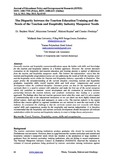Please use this identifier to cite or link to this item:
https://cris.library.msu.ac.zw//handle/11408/1559Full metadata record
| DC Field | Value | Language |
|---|---|---|
| dc.contributor.author | Nhuta, Stephen | - |
| dc.contributor.author | Makuyana, Tawanda | - |
| dc.contributor.author | Makoni, Regina | - |
| dc.contributor.author | Chauke, Abednigo | - |
| dc.date.accessioned | 2016-06-13T08:08:34Z | - |
| dc.date.available | 2016-06-13T08:08:34Z | - |
| dc.date.issued | 2015-05 | - |
| dc.identifier.issn | 2408-6231 | - |
| dc.identifier.uri | http://hdl.handle.net/11408/1559 | - |
| dc.description.abstract | Generally tourism and hospitality courses/qualifications equip the holder with skills and knowledge for the tourism and hospitality industry in a holistic approach. However, the current literature evaluation on the hospitality and tourism education and training denotes a number of differences from the tourism and hospitality manpower needs. This bolsters the industrialists’ outcry that the tourism and hospitality programmes/courses are not addressing the needs of both the tourism sector and the hospitality sector within the Tourism and Hospitality industry, especially in Zimbabwe. This paper probes the misunderstanding of the current situation concerning tourism and hospitality graduates, hospitality skills, travel/ tourism skills and both areas’ competencies and career development within the combined discipline. Literature points out that for the implementation of curricula there is a need to connect with industries and make the best use of the social resources which will contribute to students’ career development and the evaluation of curricula bolsters partnership between the tourism industry and academic institutions thus leading to a systems approach. The findings show that our tourism operators know what they want, and it is only a matter of communicating that to the educational institutions so we can churn out more highly trained and skilled waiters, chefs and front desk managers, to name a few. The tourism industry in the region believes that courses offered by regional institutions are not tailored to meet the vast needs of the industry. In conclusion the challenge is that the curricula content does not reconcile with human capital skills and competences needed by the hospitality and tourism industrialists. It is therefore recommended that the hospitality and tourism curricula development should incorporate all relevant stakeholders within the tourism and hospitality industry in order to bridge theory and practice. | en_US |
| dc.language.iso | en | en_US |
| dc.publisher | Journal of Educational Policy and Entrepreneurial Research | en_US |
| dc.relation.ispartofseries | Journal of Educational Policy and Entrepreneurial Research;Vol. 2, No.5; p. 65-83 | - |
| dc.subject | Travel, Tourism, Hospitality, career, skills and competencies | en_US |
| dc.title | The disparity between the tourism education/training and the needs of the tourism and hospitality industry manpower needs | en_US |
| dc.type | Article | en_US |
| item.grantfulltext | open | - |
| item.languageiso639-1 | en | - |
| item.fulltext | With Fulltext | - |
| item.openairecristype | http://purl.org/coar/resource_type/c_18cf | - |
| item.openairetype | Article | - |
| item.cerifentitytype | Publications | - |
| Appears in Collections: | Research Papers | |
Page view(s)
290
checked on Jan 20, 2026
Download(s)
122
checked on Jan 20, 2026
Google ScholarTM
Check
Items in MSUIR are protected by copyright, with all rights reserved, unless otherwise indicated.




